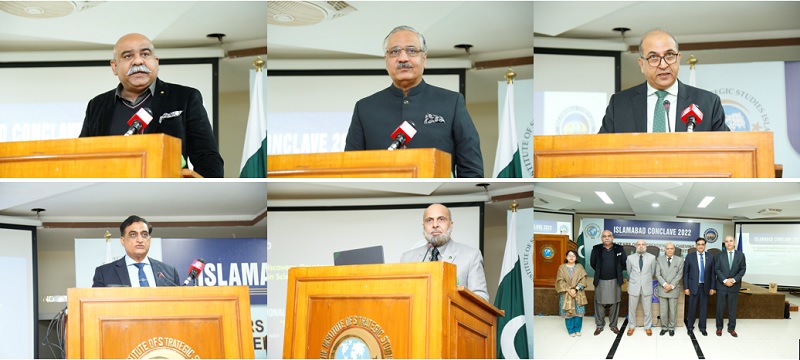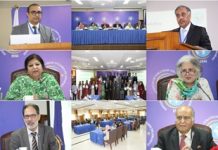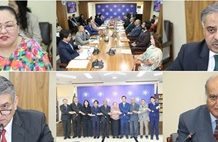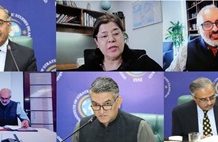Press Release
Islamabad Conclave-2022
Working Session-I: “75 Years of Independence: Achieving National Defence”
December 7, 2022

The Institute of Strategic Studies, Islamabad (ISSI) held its flagship event the Islamabad Conclave-2022 on the Theme “75 Years of Independence: Achieving Comprehensive National Security.” On day first, December 7, 2022, the Arms Control and Disarmament Centre (ACDC) at the Institute hosted the Working Session-I titled “75 Years of Independence: Achieving National Defence” on December 7, 2022.
Keynote Speaker, General Zubair Mahmood Hayat NI (M) (Retd), former Chairman Joint Chiefs of Staff Committee (CJCSC), while speaking on “A Review of 75 Years of Pakistan’s National Defence” said that Pakistan has moved from an indefensible Pakistan in 1947 to the impregnable defence today. It has been a journey with many ups and downs. Pakistan had an existential threat and will continue to have the threat which has three components – political, ideological and military. The threat Pakistan has faced contains all three elements of threat from India. Pakistan has defended its borders successfully – against limited as well as all-out wars. Pakistan continues to defend against the hybrid war that has been imposed on it. It has defended against the war on terror for the last twenty years, as well as externally sponsored internal destabilisation. Pakistan has faced all challenges with courage and perseverance. Pakistan did not introduce nuclear weapons in South Asia, nor was it the first one to test. It acquired the nuclear capability to counterbalance the threat from India. Pakistan’s nuclear capability is defensive. There are three lessons to be learned – when it comes to defence Pakistan is on its own; you cannot be defeated unless you are mentally defeated and the recipe for successful defence is the army and the nation standing together.
Earlier, Malik Qasim Mustafa, Director ACDC-ISSI, in his welcome remarks said that Pakistan has had an incredible journey spanning 75 years and has met all its requirement to protect its sovereignty and safeguard against internal and external security challenges. Pakistan seeks peace while its neighbour India is pursuing arms buildup and aggressive doctrines that are destabilising regional security. Pakistan has the capability to defend at air, land and sea as well as in outer space and the cyber domain. However, at the same time, it does not wish to indulge in an arms race.
Dr Adil Sultan, Dean of the Faculty of Aerospace and Strategic Studies (FASS), Air University Islamabad, spoke on “Conventional and Nuclear Security of Pakistan.” He said that the past 75 years have been challenging defending against one military crisis after another. However, Pakistan is a resilient nation with credible nuclear capability that it developed despite limited resources and embargoes by the West. India has pursued conventional and nuclear buildups to which Pakistan responds in the form of full spectrum deterrence that remains in the domain of credible minimum deterrence. He said that introduction of new technologies by India like ballistic missile defence systems, Anti Satellite weapons (ASAT), hypersonic missiles, Pakistan-specific MIRV missiles, and operationalising sea-based nuclear capability are purring a strain on deterrence. Talking about the US concept of integrated deterrence, he said that India as part of the US alliance – could be a beneficiary of defence and technology cooperation resulting from it. This could complicate deterrence for Pakistan. The asymmetrical conventional and nuclear threat posed by India makes it imperative that Pakistan maintain its robust nuclear capability while being cognizant of its limited resources.
Vice Admiral (Retd) Ahmed Saeed HI(M), Director General National Institute of Maritime Affairs (NIMA), while speaking on “Maritime Security of Pakistan” said that maritime security is divided into traditional and non-traditional security threats which include military security, as well as the maritime economy and human security. He especially talked about the US Asia Pacific strategy which is pivoting on India, Japan and Australia and its adverse impact on Pakistan. He also said that the provision of nuclear-capable submarines to Australia amounts to proliferation and expressed concern that the template can be replicated for India. In response to India’s ambitious naval plans, Pakistan has taken steps to build ships and submarines in collaboration with China and Turkey but which also has an indigenous component. He said that while ensuring the seaward defence of Pakistan, we need to behave like a responsible maritime nation by adopting green policies in line with international obligations. Maritime security is an integral part of national security which needs greater attention at the national level.
Air Commodore Dr Liaquat Ullah Iqbal, CPD & CEO of National Aerospace Science and Technology Park (NASTP), spoke on “Defence Indigenisation of Pakistan.” He said self-reliance in defence cannot be overemphasised. Pakistan has been growing in defence capabilities of research and development and human resource development. In this regard, he talked about the role of NASTP which is a Pakistan Air Force and Government joint project being developed as Pakistan’s first Aerospace Cluster and Smart City around PAC Kamra and PAF Base Minhas. It envisions the setup of a state-of-the-art Special Technology Zone (STZ) housing high-tech aerospace technologies design centres, public and private, national & international Aviation Industry, and Advanced Vocational Training Institutes. Pakistan is also focusing on international cooperation.
At the end of the Working Session I, Ambassador Khalid Mahmood, Chairman BoG ISSI, presented ISSI Memontos to the Speakers.











